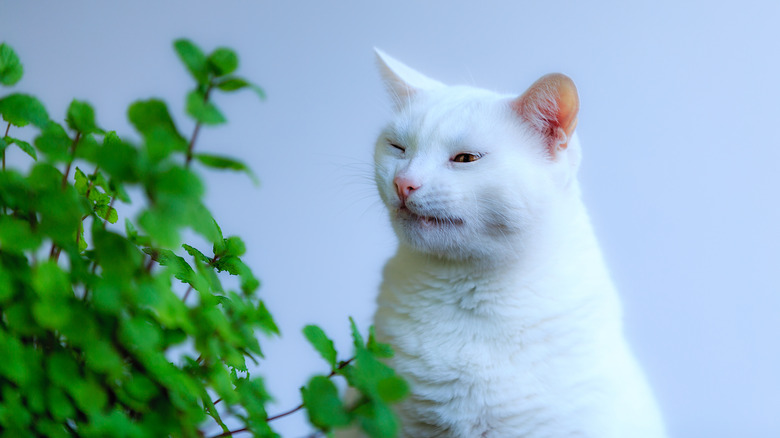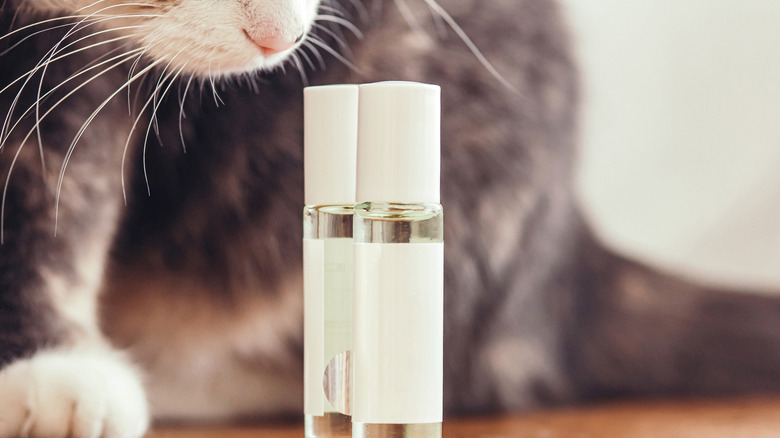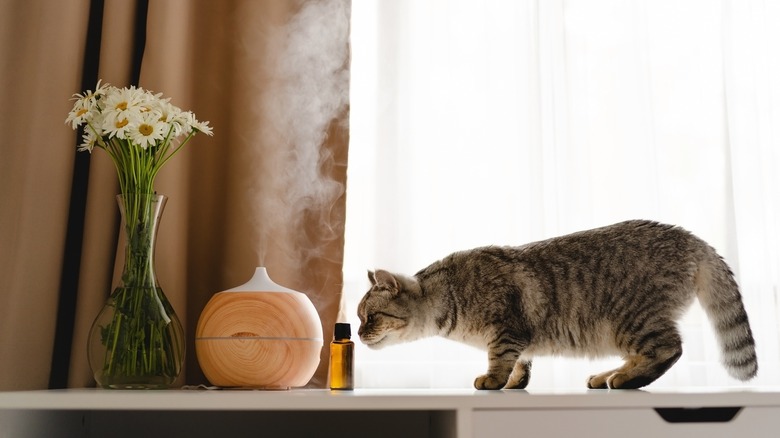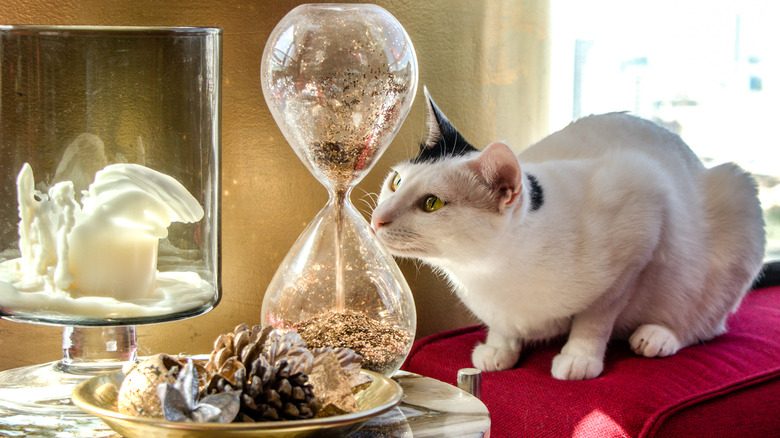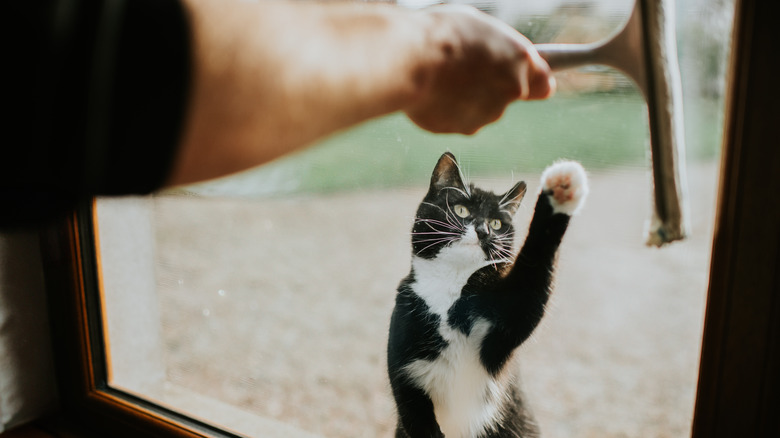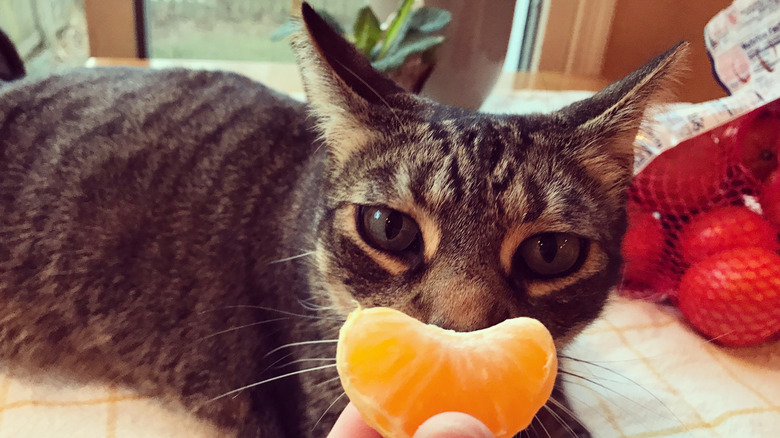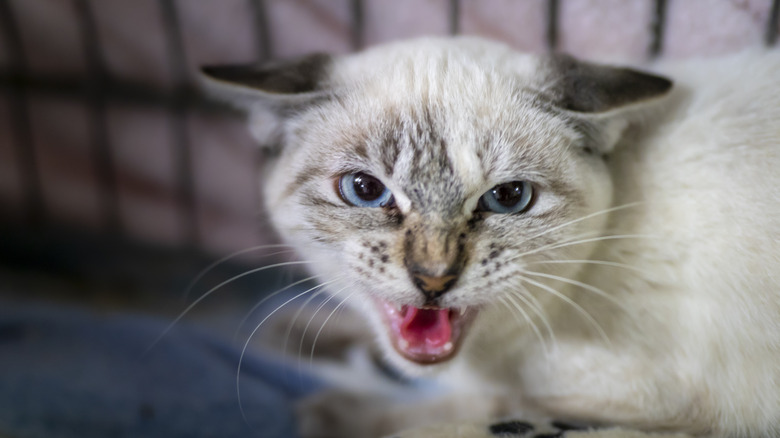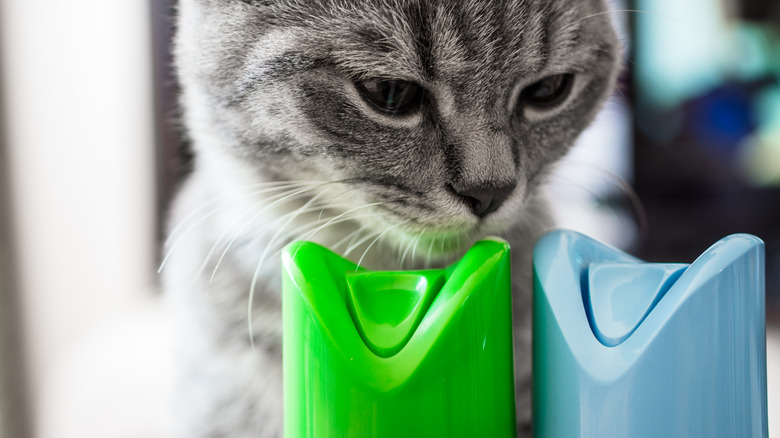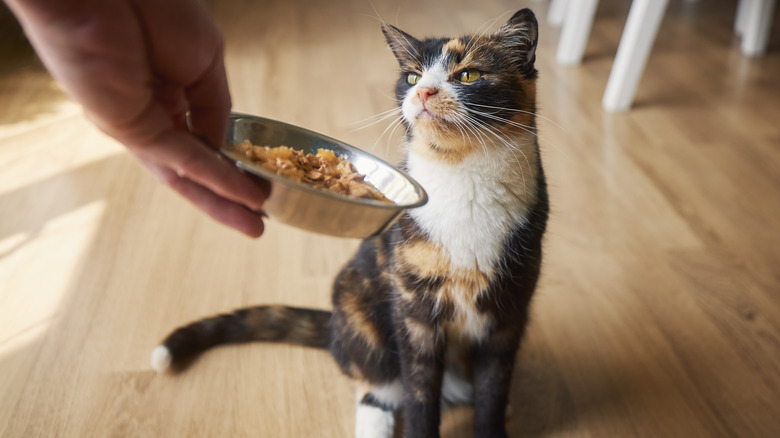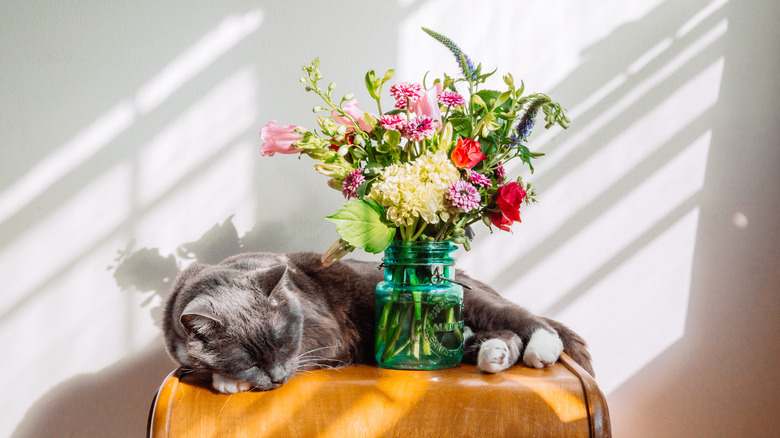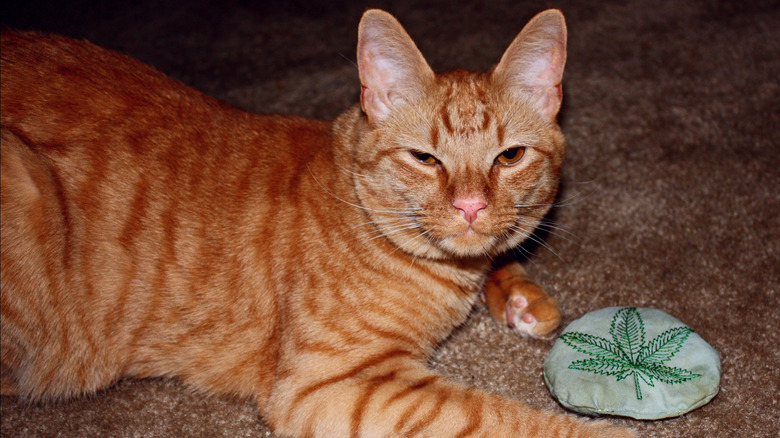13 Smells Cats Despise (And Dangerous Scents You Should Avoid At All Costs)
We may receive a commission on purchases made from links.
Who doesn't love a nice waft of essential oils, perfume, or maybe a fragrant flower? Your cat, that's who. Not because they're judgey (although, of course, they are) but because some scents are toxic to them, while others are simply too strong. Although you feline's eyesight and sense of taste aren't very sensitive, their noses are 14 times more receptive than ours — making scent one of the primary ways they relate to the world.
While it may seem counterintuitive, pure curiosity could spur your cat to investigate scents that can actually hurt or even kill them. A random scent, like that of a new piece of furniture in your house, could also make them inexplicably upset. As hard as it may seem to predict their reactions, you can reliably expect your cat to despise certain scents, with some even capable of causing them harm. And if you've struggled with sudden troublesome feline behaviors, one of these smells could be to blame.
1. A dirty litter box
A clean tray of litter naturally draws cats in, to the point that felines don't need serious potty-training practice like dogs do. Often, you only need to provide appropriate facilities and let your cat do its thing. However, that doesn't mean you don't have a role to play. As any cat owner who's let their pet's litter box get too ripe can tell you, leaving it dirty for an extended period can provoke a horrible set of consequences, including inappropriate elimination.
Once a feline has decided to start urinating or defecating somewhere other than their litter box, it can be a real struggle to convince them to go back. While every cat has a different tolerance for how grungy their litter box gets before they look for a different toilet, if you let things reach the point that they need to go elsewhere, you'll be sorry. Covered litter boxes can also cause problems by concentrating the smells inside to the point that they drive your cat away — in that case, you might simply have to remove the cover. The good news? As long as you scoop or change unscented litter frequently, you shouldn't have odor problems in the house. If you simply can't bring yourself to scoop every day, consider purchasing a self-cleaning litter box, such as Cumrige's 95 liter app-controlled model.
Other strong smells, such as scented litter, may put your cat off of litter boxes. Although some felines will use such products, others turn their noses up at it. It can also exacerbate respiratory problems like asthma. Finally, if your cat reluctantly shares potty space with a rival, they might be upset by something as seemingly simple as the smell of that other feline in the litter box. Offering lots of litter boxes in different places throughout the house can help solve this problem, but you might also need to backtrack and re-introduce your cats to help everyone in the house get along.
2. Perfume, cologne, and other scented body products
Because cats have such a heightened sense of smell, scents that seem subtly pleasant to us, such as perfume and cologne, may overwhelm them. You'll know pretty quickly if your feline friend finds your choice of "decorative" scents repulsive; just watch their body language before and after you spritz on some fragrance.
Even if your cat doesn't seem to mind your scent "add-ons," some of the oils used in those products can be downright toxic to your cat's surprisingly sensitive respiratory system. To safeguard your feline's health, consider checking the fragrance ingredients against a list of poisonous cat substances, play it safe by going au naturel, or put on your favorite body spray as the final, finishing touch as you scoot out the door.
Perfumes may also crop up in an unexpected place where they have the potential to cause allergic skin reactions for some cats: shampoos and other products meant for use on pets. Fortunately, felines have a natural tendency to keep themselves clean — as long as they don't have any health issues, they don't need additional scents to make them smell good. If your cat has a funky odor, take them to the vet to find the root of the problem.
3. Essential oils
Essential oils are safe, right? Not necessarily. Although they might be a good option for humans with allergies or sensitivities to fragrances, essential oils can harm cats, as they lack the liver enzymes required to metabolize them. It doesn't really matter how they take in the essential oils: Whether you apply them to their skin or they walk through oils left on household surfaces or inhale them from a diffuser, the substances can build up in your cat's system to the point of toxicity.
The hazards of essential oils often come as a surprise to pet owners, so the safest choice is to simply not use them on or around your cats. Remain alert to the signs of essential oil toxicity, which may include lethargy, drooling, vomiting, and tremors, per PetMD. Purple gums and abnormal breathing, including breathing with an open mouth or taking more than 40 breaths per minute, number among the signs that your cat is having a genuine medical emergency and needs to go to the veterinarian or an emergency clinic immediately. Some of the most dangerous essential oils for cats include peppermint, tea tree, clove, and eucalyptus, but this is not an exhaustive list.
If you simply can't give up your essential oils, help your cat out by diluting them as much as possible and offering lots of air circulation in the room. Just as importantly, make sure your feline has a clear escape route to get away from the smells, and watch them for any signs of discomfort.
4. Scented candles, potpourri, and incense
A tray of potpourri, a few sticks of incense, or a pleasantly scented candle may seem harmless to you — but they can do more to your cat than just irritate and overwhelm their sensitive nose. For example, liquid potpourri may contain non-cat-safe detergents. The essential and concentrated fragrance oils often present in these scented items may be toxic, too. While you likely won't rub them on your cat, the particles from your scented goods can settle on your feline's fur, who will then ingest them when they groom themselves. Digestive and neurological issues and a host of other health problems might follow.
If you absolutely can't do without these items, limit your cat's access to them as much as possible. That means putting dry potpourri well out of reach so your pet can't have a little nibble, ventilating rooms where you use these products, diluting the fragranced substances as much as possible, and utilizing them in a separate space from your cat. Above all, make sure your feline has a way to get away from the smells, and monitor them for any signs of discomfort or distress.
5. Cleaning solutions
Have you ever read the fine print on the back of your household cleaner bottles? Most of them state that they are hazardous to humans and household pets, cause skin and eye irritation, and should not be ingested. But licking is your cat's only option for cleaning themself, so any household cleaners that make it onto their body will eventually end up in their mouth.
Then there are the fumes. We all know that expecting cats to stay away from a freshly cleaned surface is futile; they want to investigate anything new and interesting. Unfortunately, many felines love the scent of bleach in particular, and inhaling it consistently can lead to serious health consequences.
Keeping your cats in a separate room while you clean, rinsing freshly cleaned surfaces as well as possible, and ventilating that newly cleaned space are all things you can do to reduce your cat's exposure to these cleaning agents. Or, you might consider switching to pet-safe cleaning products.
6. Citrus
While the topic has some room for debate, citrus, like many other scents humans find pleasurable, likely overpowers and irritates your cat's sense of smell. In fact, people often recommended citrus as a deterrent or repellent for felines – you may have even already tried putting citrus peels around your houseplants to keep cats from digging or spritzing a citrus scent on furniture to dissuade them from climbing on or scratching it.
Some individuals believe that citrus might have other uses when it comes to cats. For example, at least one animal shelter has floated the theory that ambient citrus scent can ease separation anxiety in cats. Should that be you go-to option at home? Probably not, as orange and other citrus fruits are, in fact, toxic to felines, meaning utilizing them comes with real risks, including vomiting, diarrhea, skin reactions, and depression (per American Society for the Prevention of Cruelty to Animals). If you have a feline that experiences stress or anxiety, consider using cat pheromone diffusers or sprays instead. Though not a magic bullet to remedy a stressful environment or problematic behaviors, such products can help — and they're not toxic to your cat.
7. Capsaicin
You can expect anything containing capsaicin — the chemical compound that makes peppers hot and spicy — to irritate your cat's sensitive nose if they get too close. Capsaicin is such an irritant that it's concentrated for use in personal defense sprays. It's even utilized, in super-sized canisters, as a direct deterrent against bears. It might even work to fend off some insects, too.
You can put this irritant to work for you, in a very diluted form, as one ingredient in a blend of spices to keep your cat away from forbidden spaces. However, there is some debate as to whether such methods are humane due to the suffering it could put your pet through. Foods containing capsaicin, like red chili pepper, are considered toxic to cats. Beyond irritation and pain, they can lead to gastrointestinal upset if ingested. If your cat doesn't experience anxiety, consider utilizing motion-activated deterrents to keep felines off of surfaces like kitchen counters instead.
8. The scent of other animals
Have you ever spotted your cat rubbing their body and cheeks against surfaces around the house, and maybe even doing the same to you? Felines do this to spread their scent and establish their territory and comfort zone. If you have more than one cat, you might even see them competing in an arms race of sorts to see who can scent-mark you or their favorite spots to claim the most "ownership" of them.
As much as familiar scents can comfort your cat, unfamiliar scents can disturb them — not just inside the house, but outside as well. In fact, something as simple as the scent of other cats or unfamiliar animals around your yard can drive your indoor feline to unwanted behaviors, such as aggression or urine marking. They use the latter to declare ownership of the territory and comfort themselves with the familiarity of their own smell. It can take some detective work to figure out why your cat has started spraying but, because their urine functions as such a strong scent marker, the cause can easily be any new, unfamiliar animal scent in or near your home.
9. Air fresheners
If you've ever walked into a room where somebody has sprayed a large amount of air freshener, you already know that they can be too much of a good thing. Once you factor your cat's uber-sensitive nose into the mix, it's easy to understand how even a few spritzes can be the scent equivalent of shouting in a quiet room. And that's before you even consider whether some ingredients in the air freshener may be toxic to your cat — and to you, too.
A 2011 study published in the journal Environmental Impact Assessment Review found two dozen toxic or hazardous volatile organic compounds in the air fresheners researchers tested, with only one of them actually appearing on the product label. Instead of spraying air fresheners, consider addressing the root cause of your reliance on such products. If use them to cover up litter box smells, you might need to scoop or clean it more frequently, or perhaps switch to a litter that clumps better or counteracts odors more effectively.
10. Spoiled food
Cats are obligate carnivores: They must eat meat to get all the nutrients their bodies require. Thanks to their keen sense of smell, they're also skilled at discerning when meat (or other food) isn't good to eat and refusing anything that doesn't seem safe. Their stomachs are acidic enough to help neutralize many pathogens if they do happen to eat meat that's gone a little "off." But even with his highly-efficient hunter's body, your cat is still vulnerable to food poisoning, so the smell of food gone bad is both a scent they despise and one that can hurt them.
There's yet another side to your cat's eating habits that can be a challenge: Some cats are just picky eaters or, as one frustrated owner confided in the cat food aisle as she searched for yet another alternative to offer her fastidious eater, "My cat is a jerk." That pickiness could occur for medical reasons, of course, so it's always good to give your veterinarian an opportunity to weigh in. But it can also be a habit they learned from their mother, a result of how the food is served or where you've placed it — or maybe your cat just enjoys watching you scramble to please them.
Paying close attention to the "smell-o-vision" view of your cat's food — has it been placed near a stinky litter box, or would adding a more palatable topper help inspire your feline to eat? — is one piece of solving the food riddles cats sometimes present.
11. Menthol
Much like catnip, some cats are attracted to menthol while others hate it. That's actually not a huge surprise, because both plants share common ancestry as members of the mint family. What's less clear is whether menthol fascinates some cats for the same reason catnip does: It mimics feline sex hormones.
The good news is that if your cat is fascinated by a mentholated product that you've put on your skin, a lick or two of that menthol generally won't hurt them — and they're just duplicating the behavior of bigger cats like lions and tigers, who are so drawn to menthol that zookeepers sometimes apply a bit to spots in their enclosures to keep them occupied. Larger doses can harm your cat, though, so if they're truly obsessed with menthol it's best to keep those products shut away, out of their reach. You can always get them some catnip instead.
12. Lilies (and some other flowers)
It's hard to tell exactly what lilies smell like to cats, but one thing is certain: These beautiful flowers are so toxic for felines, there is no "safe" level of dosage or exposure. Even something as simple as your cat passing through a tiny bit of fallen pollen from the flowers or water from the vase and then licking their paws can be enough to send them into irreversible kidney failure. The only safe option is to keep lilies out of your house entirely and, if your cat goes outside, keep them out of the yard, too.
If you think your cat has been exposed to lilies and see them exhibiting signs such as lethargy, drooling, loss of appetite, or vomiting (per the FDA), take them to the vet immediately — with a sample or at least a photo of the lilies in question if possible, packaging that sample up so that there's no chance of further exposure to your feline. A cat who's been exposed to lilies can go downhill quickly, experiencing kidney failure in as few as 24 hours, but speedy veterinary intervention may save them. Other toxic flowers to watch out for include peonies, daffodils, tulips, amaryllis, irises, and dahlias.
13. Marijuana and cigarette smoke
Yes, your cat can get high if you smoke around them — but they'll also get sick. "Marijuana in all forms is toxic to pets," Dr. David Gonsky, founder and chief veterinarian at West Loop Veterinary Care, advised WTTW. The high will likely cause them distress, too, as a feline won't understand what's going on the way a human would.
Secondhand cigarette smoke is also harmful to your cat, increasing their chances of developing asthma or cancer. Even what some vets call "thirdhand smoke," the particles and residue that cling to objects in your house, can be a severe irritant and health risk to your pet. That doesn't necessarily mean you have to give up smoking. But for the sake of your furry loved ones, consider taking it outside to ensure they have plenty of room to breathe.
If you believe your pet has consumed a toxic substance and you can't reach your veterinarian or an emergency clinic, please contact the ASPCA 24/7 Poison Control Hotline at 888-426-4435 or the Pet Poison Helpline at 855-764-7661.
